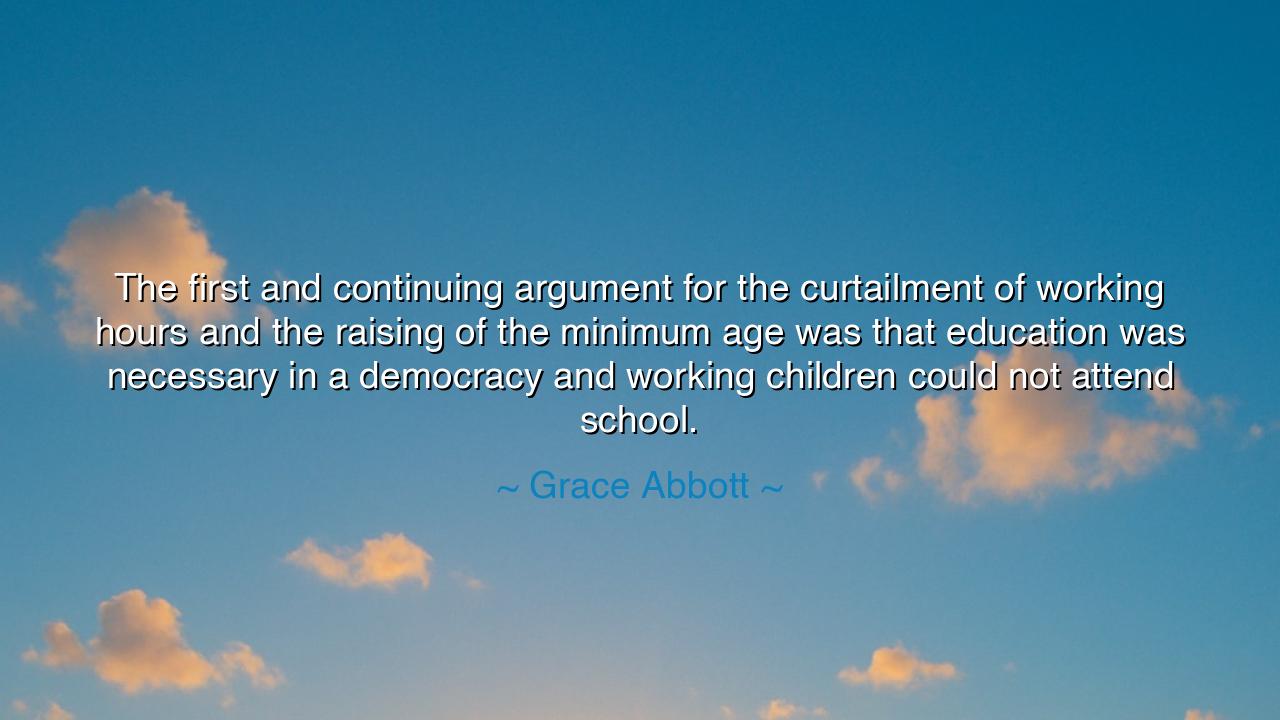
The first and continuing argument for the curtailment of working
The first and continuing argument for the curtailment of working hours and the raising of the minimum age was that education was necessary in a democracy and working children could not attend school.






When Grace Abbott, the tireless reformer and protector of children, declared, “The first and continuing argument for the curtailment of working hours and the raising of the minimum age was that education was necessary in a democracy and working children could not attend school,” she was not merely describing a policy — she was proclaiming a moral awakening. Her words emerge from an age when childhood itself was in peril, when the smallest hands were sent into factories and mines, and the laughter of learning was replaced by the clatter of machinery. With this statement, Abbott named the foundation of a just society: that education is the birthright of every child, and that democracy cannot live unless knowledge is its seed.
In the early years of the twentieth century, when Abbott fought her battles, the streets and mills of America were filled with the faces of working children — some no older than seven or eight, their backs bent beneath the weight of labor. They were the forgotten builders of an industrial empire, deprived of books, play, and hope. To many of the powerful, their toil was “necessary,” their suffering invisible. But Abbott saw what others refused to see: that a nation which sacrifices its young for profit wounds its own soul. Her argument for education was not sentimental — it was revolutionary. For she understood that without an educated people, democracy becomes an empty shell, ruled by ignorance instead of wisdom, by power instead of principle.
Abbott’s vision was both practical and profound. She knew that every hour a child spent at the loom or the mine was an hour stolen from their mind — an hour that might have been spent learning the history of freedom, the laws of justice, the songs of the heart. To curtail working hours and raise the minimum age was, in her eyes, not an act of charity but of salvation. The measure of a civilization, she believed, was not in its wealth or its armies, but in how it nurtured its young. Education, then, was not merely a privilege; it was the lifeblood of self-government, the light by which democracy sees itself.
To grasp the heroism of her struggle, one must remember the world she faced. The forces arrayed against her were vast — industrial magnates, political machines, and social apathy. Yet Abbott, armed with reason and compassion, became one of the leading architects of the Child Labor Laws in the United States. She, alongside her sister h Abbott and allies like Jane Addams, worked to ensure that children would no longer be denied education by the cruel demands of labor. Her success was not swift, nor was it complete, but it reshaped the moral landscape of a nation. Through her work, the idea that every child deserved both protection and learning became a cornerstone of modern democracy.
This truth has echoed through the ages. In every civilization that has endured, education has been the guardian of liberty. The philosopher Plato wrote that the uneducated citizen cannot govern himself, and the ungoverned mind is easily enslaved. In the same spirit, Grace Abbott’s warning rings clear: when a society allows its children to work instead of learn, it plants the seeds of tyranny. For ignorance breeds dependence, and dependence breeds oppression. A people robbed of learning cannot defend their freedom, nor imagine a better world.
Yet her words also speak to our present moment. Even now, across the earth, millions of children labor in fields and factories instead of sitting in classrooms. Their dreams are ground beneath the same machinery Abbott once fought to dismantle. The battle for education is never finished; it must be waged anew in every generation. Her quote stands as both reminder and command — that the work of protecting childhood and preserving knowledge belongs to all who call themselves free.
So, O listener, let this be your lesson: a democracy that neglects its children prepares its own downfall. If you would keep liberty alive, protect learning; if you would build a just world, guard the classroom as sacred ground. Support those who teach, defend those who learn, and remember that every book opened in a child’s hands is a shield raised against ignorance and despair.
Thus, the teaching endures: education is the heartbeat of freedom, and childhood its tender promise. Grace Abbott’s words remind us that the strength of a nation does not lie in its wealth or its weapons, but in the light within its schools — in the minds of the young, unchained by labor, awakened by knowledge, and prepared to lead the world toward justice and truth.






AAdministratorAdministrator
Welcome, honored guests. Please leave a comment, we will respond soon